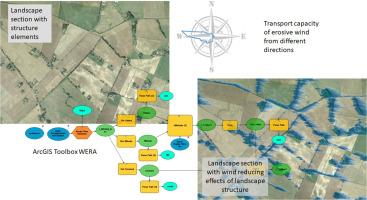A GIS-toolbox for a landscape structure based Wind Erosion Risk Assessment (WERA)
IF 1.9
Q2 MULTIDISCIPLINARY SCIENCES
引用次数: 0
Abstract
The landscape structure influences the local wind field by lowering the wind speed and thus reducing the wind erosion risk. An important parameter is the height of each landscape element, as this determines the length of wind protection behind it. Further determining parameters are the wind speeds above a threshold value for initiating wind erosion and the corresponding wind directions. The presented method combines heights of landscape elements and the directional transport capacities of erosive wind speeds to derive a map of the spatial wind speed reduction by landscape structures. This map can be combined with the soil-derived erodibility map to get finally a wind erosion risk map which includes landscape effects.
- •The ArcGIS toolbox “WERA” allows a detailed analysis of the landscape structure on wind erosion processes,.
- •The method allows both the identification of risk areas and needs for additional plantings of LE.
- •The area-specific query determines the wind erosion risk for field blocks, districts or municipalities.

基于景观结构的风蚀风险评估(WERA)地理信息系统工具箱
景观结构通过降低风速来影响当地风场,从而降低风蚀风险。一个重要的参数是每个景观元素的高度,因为这决定了其背后的防风长度。进一步的决定性参数是风速是否超过引发风蚀的临界值以及相应的风向。所提出的方法结合了景观元素的高度和侵蚀风速的定向传输能力,得出了景观结构降低空间风速的地图。通过 ArcGIS 工具箱 "WERA",可以详细分析景观结构对风蚀过程的影响。
本文章由计算机程序翻译,如有差异,请以英文原文为准。
求助全文
约1分钟内获得全文
求助全文
来源期刊

MethodsX
Health Professions-Medical Laboratory Technology
CiteScore
3.60
自引率
5.30%
发文量
314
审稿时长
7 weeks
期刊介绍:
 求助内容:
求助内容: 应助结果提醒方式:
应助结果提醒方式:


